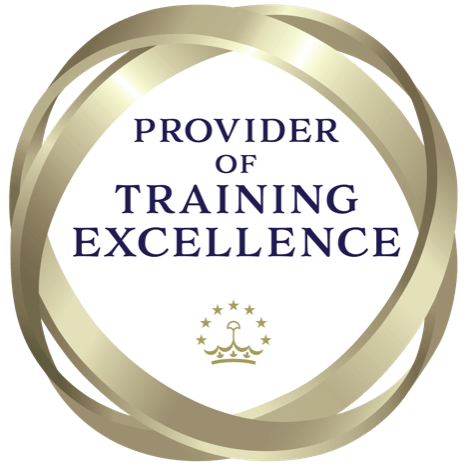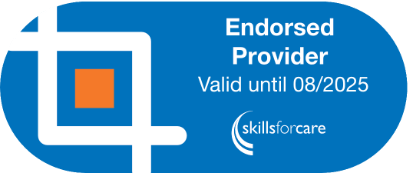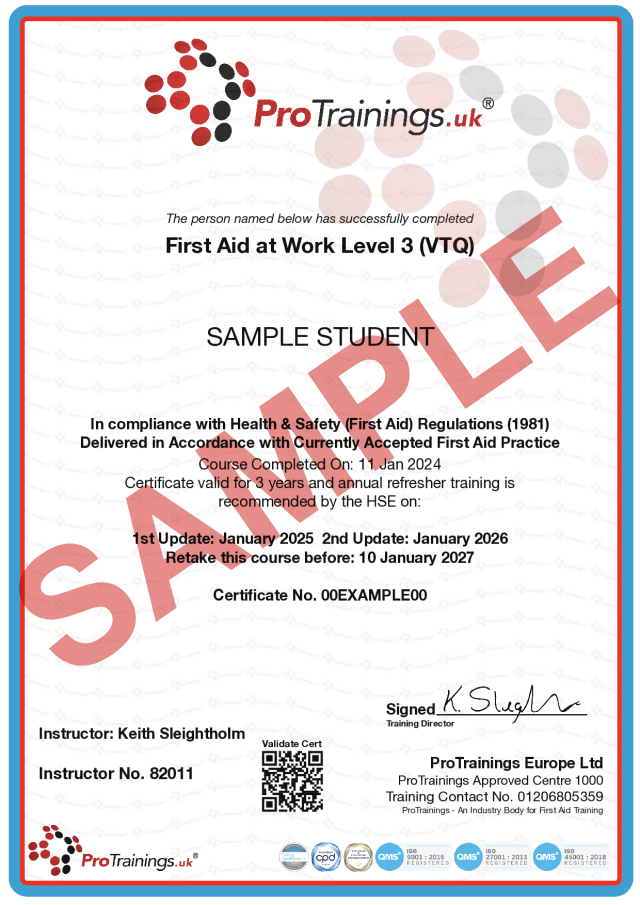


The ProTrainings First Aid at Work Level 3 (VTQ) Requalification Qualification (FAW) is ideal for most businesses whose risk assessment has identified that they require a fully trained first aider for their workplace and they need to requalify their certification. All courses are delivered, evaluated and quality assured to meet the new guidelines set out by the HSE and meet the requirements of the First Aid at Work (First Aid) regulations 1981.
The SIA will accept this training certificate for those seeking employment in the door supervision and security guard sector.
This is a 100% classroom course over two days but we also offer blended training where you complete one day online, saving a day in the classroom.
All our first aid courses fully meet the latest UK and European Resuscitation Council Guidelines as per the HSE requirements. ProTrainings Vocational Training Qualifications (VTQ) are fully recognised by the HSE as Trade Body Qualifications.
This course must be at least 12 contact hours and run over a minimum of 2 days and the certificate is valid for 3 years. In May 2016 the HSE and Awarding Organisations announced that computer-based blended training is now allowed for all workplace first aid courses.
You can now renew your First Aid at Work qualification, with one day of classroom training after completing this online course. Reduce your training and travel costs by using our engaging, blended online video-based course. Learn at your pace, one to one with your instructor at a time that suits you.
This blended FAW Requalification course meets all of the requirements under the HSE and Awarding Organisations and is available as a ProTrainings or Regulated Qualification.
If you prefer the traditional 2 days First Aid at Work Requalification course, we can do that too, just contact us for more information.
A modern approach to training backed up by years of experience delivering online, blended and classroom courses. Clear, concise and engaging, when you choose ProTrainings you reduce the cost, not the quality of your training.
Candidates completing our FAW courses receive access to our video library for refreshing skills and reference
This course is only for people who already hold a valid First Aid at Work certificate and they can take this 2-day course rather than the full 3-day FAW. You must have a copy of your original certificate.
The HSE strongly recommend that all first aiders complete an annual first aid refresher courses and our online course meets this requirement.
Please note that learners undertaking a ProTrainings Trainings Course have the option to choose to take a regulated qualification. The ProTrainings First Aid at Work Qualification is accepted by TQUK as a qualification for first aid instructors who wish to offer their regulated qualifications. This is because it meets all of the required learning outcomes and due diligence.
Please be advised that the classroom course has a minimum age requirement of 14.
The content of this and all our courses has been independently certified as conforming to universally accepted Continuous Professional Development (CPD) guidelines and come with a Certified CPD Statement as well as a ProTrainings Certificate and for online courses an Evidence Based Learning statement.
- Factories
- Manufacturing
- Construction and Building
- Distribution
- Forestry (see also our FAW Forestry course)
- High-risk businesses
- Agriculture
- Sports
- Outdoor Pursuits and Exploring
- Any workplace where a higher level of training is required
This course comes with 12.0 hours of CPD, although the time to complete the course online may be less than this.
The content of this and all our courses has been independently certified as conforming to universally accepted Continuous Professional Development (CPD) guidelines and come with a Certified CPD Statement as well as a ProTrainings Certificate and for online courses an Evidence Based Learning statement.
Unit 1: Emergency First Aid in the Workplace (credit can be given in some cases if already completed recently)
1 Understand the role and responsibilities of a first aider.
1.1 Identify the role and responsibilities of a first aider.
1.2 Describe how to minimise the risk of infection to self and others.
1.3 Identify the need for establishing consent to provide first aid.
1.4 Complete an accident report form.
1.5 Identify the first aid equipment that should be available in a workplace.
1.6 Describe the safe use of first aid equipment.
2 Be able to assess an incident.
2.1 Conduct a scene survey.
2.2 Conduct a primary survey of a casualty.
2.3 Give examples of when to call for help.
3 Be able to manage an unresponsive casualty who is breathing normally.
3.1 Assess a casualty’s level of consciousness.
3.2 Open a casualty’s airway and check breathing.
3.3 Explain why it is important to place an unconscious casualty into the recovery position.
3.4 Place an unresponsive casualty in the recovery position.
3.5 Manage a casualty who is in a seizure.
4 Be able to manage an unresponsive casualty who is not breathing normally.
4.1 Recognise the need to commence Cardio Pulmonary Resuscitation.
4.2 Demonstrate Cardio Pulmonary Resuscitation using a manikin.
5 Be able to recognise and assist a casualty who is choking.
5.1 Describe how to identify a casualty with a
Partially blocked airway
Completely blocked airway
5.2 Administer first aid to a casualty who is choking.
6 Be able to manage a casualty with external bleeding.
6.1 Identify the types of external bleeding.
6.2 Control external bleeding.
7 Be able to manage a casualty who is in shock.
7.1 Recognise shock.
7.2 Administer first aid to a casualty who is in shock.
8 Be able to manage a casualty with a minor injury.
8.1 Administer first aid to a casualty with small cuts, grazes and bruises.
8.2 Administer first aid to a casualty with minor burns and scalds.
8.3 Administer first aid to a casualty with small splinters
Unit 2: Recognition and Management of Illness and Injury in the Workplace
1 Be able to conduct a secondary survey.
1.1 Identify the information to be collected when gathering a casualty history.
1.2 Conduct a head to toe survey.
2 Be able to administer first aid to a casualty with injuries to bones, muscles and joints.
2.1 Recognise suspected; Fractures, Dislocations, Sprains and strains
2.2 Administer first aid for; Fractures, Dislocations, Sprains and strains
3 Be able to administer First Aid to a casualty with suspected head and spinal injuries.
3.1 Recognise suspected; Concussion, Skull fracture, Cerebral compression, Spinal injury
3.2 Administer first aid for suspected; Concussion, Skull Fracture, Cerebral compression, Spinal injury
4 Be able to administer First Aid to a casualty with suspected chest injuries.
4.1 Recognise the different types of a chest injury.
4.2 Administer first aid for a chest injury.
5 Be able to administer First Aid to a casualty with burns and scalds.
5.1 Recognise the factors that affect the severity of burns and scalds.
5.2 Administer first aid for burns involving; Dry heat, Wet heat, Electricity and Chemicals
6 Be able to administer First Aid to a casualty with an eye injury.
6.1 Give examples of common eye injuries.
6.2 Administer first aid for eye injuries involving; Dust, Chemicals and Embedded objects
7 Be able to administer First Aid to a casualty with sudden poisoning.
7.1 Identify the routes that poisons can take to enter the body.
7.2 Administer immediate first aid to a casualty affected by sudden poisoning.
7.3 Identify sources of information for treating those affected by sudden poisoning.
8 Be able to administer First Aid to a casualty with anaphylaxis.
8.1 Identify common triggers for anaphylaxis.
8.2 Recognise anaphylaxis.
8.3 Administer immediate first aid for a casualty suffering from anaphylaxis.
9 Be able to provide First Aid to a casualty with suspected major illness.
9.1 Recognise major illnesses including; Heart Attack, Stroke, Epilepsy, Asthma and Diabetes
9.2 Administer first aid to a casualty suffering from major illnesses including; Heart Attack, Stroke, Epilepsy, Asthma and Diabetes
- ProForm 10 - Open Response - FAW and FAW Requalification Level 3 Theoretical Assessment
- Student Manual (V8.7) - Workplace First Aid
- EmergencySMS service leaflet
- Adult CPR Flowchart
- Adult CPR Flowchart handout/poster
- Asthma UK weblink
- Catastrophic bleeding and trauma First Aid Guidance From ProTrainings.
- Celox leaflet on haeostatic dressings
- Child CPR Flowchart
- Child CPR Flowchart handout/poster
- Clean hand techniques leaflet
- Coronavirus (COVID-19) - link to the NHS website
- EpiPen Guide
- EpiPen patient information sheet
- Essentials of health and safety at work link to HSE website
- Find out what other courses are available as video online, blended and classroom courses nationally - our course finder
- Free student first aid program leaflet
- Government Advice - Best Practice Hand Rub
- Government Advice - Best Practice Hand Wash
- HSE First Aid at Work Regulations
- HSE guide to the Reporting of Injuries, Diseases and Dangerous Occurrences Regulations 19
- HeartSine 350 Information Leaflet
- Heartsine 500 AED unit leaflet
- Home Emergency Contact Sheet
- How to register to call EMS by text
- How to use Celox Haemstatic gauze
- IPAD SP1 AED Leaflet
- Infant CPR Flowchart
- Infant CPR Flowchart handout/poster
- Jext Product Data Sheets
- Jext patient Information Sheet
- Link to our Concussion ad Brain injury course in association with Headway, a head injury charity
- Link to the HSE website
- NHS Choices Web link
- Oxygen User Instructions - Gas rentals are available from ProTrainings, contact us for more information
- Oxygen and Analgesic gases from ProTrainings
- ProTrainings - Using an AED Leaflet
- ProTrainings Defibrillator eGuide
- Proper CPR Hand Placement for Adults Children Infants leaflet
- RIDDOR link to the HSE guide
- Sign up for free Student First Aid - use code SCH-376-61-571
- Student Manual (V7.0) - First Aid - Arabic
- Student Manual (V7.0) - First Aid - Spanish
- Student Manual (V8.3) - Pierwsza Pomoc w Pracy Ksiazka studenta - Polish
- Student Manual (V8.6) - Anatomy and Physiology Human Body
- Student Manual (V8.6) - First Aid - Welsh
- Student Manual V8.6 - First Aid - Dutch
- Student Manual V8.6 - First Aid - Portuguese
- Student manual V8.6 - First Aid - French
- Student manual V8.6 - First Aid - Ukrainian
- Student manual V8.6 - First Aid Manual Italian
- Visit the First Aid Show free for first aid and medical videos
- Web link to the Joint Epilepsy Council website - JEC
- Workplace Accident Book
- Workplace Emergency Contact Sheet
- Woundclot - haemostatic gauze for all types of bleeding
- Woundclot leaflet with price list - 2025
What is CPD and why is having Certified CPD important?
CPD stands for Continuous Professional Development and is required in many business sectors. Even if you do not require a set CPD credit level, having Certifed CPD ensures the quality of training. ProTrainings are the highest gold standard of CPD ensuring that all courses are externally verified and mapped to the highest levels.
What is "SCORM ready" and will courses run on a LMS?
SCORM Ready means that online courses can run on any compatible Learning Management System (LMS). SCORM courses run seamlessly on your existing LMS system without a separate login so staff only login using the existing company system. ProTrainings online courses have an advanced SCORM ready system to give more features than any other company.
Do I receive a certificate after completing your online training?
Yes, when you complete the online course you will be able to download and print a compliant completion certificate, evidenced-based learning statement to confirm course content and a certified CPD statement. There is no extra charge for the certificate. You can also buy a printed certificate to be posted to you for a small extra fee.
What training courses do you offer and how are they delivered?
We offer a full range of training courses across all business sectors as video online, blended and nationwide at your business or our local training centres. With over 350 courses you can learn at a time and place that meets your busy schedules and save money on travel and costs away from the office.
Are your courses Endorsed?
Yes, all ProTrainings courses are Endorsed by TQUK in addition to other approvals and endorsements to give you a quality compliant qualification for your courses whatever delivery method you take.
Why do I need accredited training courses?
Whether you are employed, running a business or taking training for other reasons, you need to ensure the course is trustworthy and will pass due diligence checks. Taking courses that are accredited gives you peace of mind of the quality, compliance and that your certificate will be accepted. Choosing ISO companies to ensure they are externally verified.
Are courses all online or can I take a blended or class course locally?
Most of our courses are available as online or classroom-based at a training centre locally. We can also send an instructor to your business to save travel and tailor the course to your business. To save time and money you can take most courses in a blended format with online and class training.



